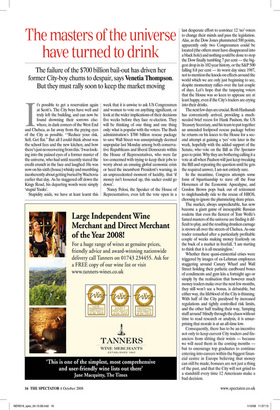The masters of the universe have turned to drink
The failure of the $700 billion bail-out has driven her former City-boy chums to despair, says Venetia Thompson. But they must rally soon to keep the market moving It’s possible to get a reservation again at Scott’s. The City boys have well and truly left the building, and can now be found drowning their sorrows elsewhere, in dark corners of the West End and Chelsea, as far away from the prying eyes of the City as possible. ‘“Reduce your risk. Sell. Get flat.” But all I could think about was the school fees and the new kitchen, and how there’s just no recovering from this.’ I was looking into the pained eyes of a former master of the universe, who had until recently stared the credit crunch in the face and laughed. He was now on his sixth (house) whisky and mumbling incoherently about getting buried by Wachovia earlier that day. As he staggered off down the
L 008:SCTATO AS 30/09/008
Kings Road, his departing words were simply ‘stupid Yanks’.
Stupidity aside, we have at least learnt this week that it is unwise to ask US Congressmen and women to vote on anything significant, or look at the wider implications of their decisions five weeks before they face re-election. They will be thinking of one thing and one thing only: what is popular with the voters. The Bush administration’s $700 billion rescue package to save Wall Street was unsurprisingly deemed unpopular last Monday among both conservative Republicans and liberal Democrats within the House of Representatives, who were far too concerned with trying to keep their jobs to worry about an ensuing global economic crisis or heed the incumbent President’s warning, in an unprecedented moment of lucidity, that ‘if money isn’t loosened up, this sucker could go
age
down’.
Nancy Pelosi, the Speaker of the House of Representatives, even left the vote open in a last desperate effort to convince 12 ‘no’ voters to change their minds and pass the legislation. Alas, as the Dow Jones plummeted 500 points, apparently only two Congressmen could be located (the others must have disappeared into a black hole) and nothing could be done to stop the Dow finally tumbling 7 per cent — the biggest drop in its 102-year history, or the S&P 500 falling 8.8 per cent — its worst day since 1987, not to mention the knock-on effects around the world which we are only just beginning to see, despite momentary rallies over the last couple of days. Let’s hope that the taxpaying voters that the House was so keen to appease are at least happy, even if the City’s traders are crying into their drinks.
The next few days are crucial. Rosh Hashanah has conveniently arrived, providing a muchneeded brief recess for Hank Paulson, the US Treasury Secretary, and his team to put together an amended foolproof rescue package before he returns on his knees to the House for a second attempt at gaining a ‘yes’ vote later in the week, hopefully with the added support of the Senate, who vote on the Bill as The Spectator goes to print. Why they are bothering calling it a vote at all when Paulson will just keep tweaking the Bill and repeating the question until he gets the required answer, I am not entirely sure.
In the meantime, Congress attempts some form of bipartisanship to stave off the Four Horsemen of the Economic Apocalypse, and Gordon Brown pops back out of retirement to singlehandedly ride to the rescue of HBOS, choosing to ignore the plummeting share prices.
The market, always unpredictable, has now become a giant game of inescapable Russian roulette that even the fiercest of Tom Wolfe’s famed masters of the universe are finding it difficult to play, and the resulting drunken carnage is strewn all over the streets of Chelsea. As one trader remarked after a particularly profitable couple of weeks making money fearlessly on the back of a market in freefall, ‘I am starting to think that it is all meaningless.’ Whether these quasi-existential crises were triggered by images of ex-Lehman employees staggering around Canary Wharf and Wall Street holding their pathetic cardboard boxes of condiments and gym kits a fortnight ago or simply by the realisation that however much money traders make over the next few months, they still won’t see a bonus, is debatable, but either way, the lifeblood of the City is thinning. With half of the City paralysed by increased regulations and tightly controlled risk limits, and the other half trading their way, ‘lamping stuff around’ blindly through the chaos without time to read research or analysis, it is unsurprising that morale is at an all-time low.
Consequently, there has to be an incentive not only to keep current City traders and financiers from slitting their wrists — because we will need them in the coming months — but to encourage top graduates to continue entering into careers within the biggest financial centre in Europe believing that money can still be made, bonuses are not just a thing of the past, and that the City will not grind to a standstill every time 12 Americans make a bad decision.










































































 Previous page
Previous page